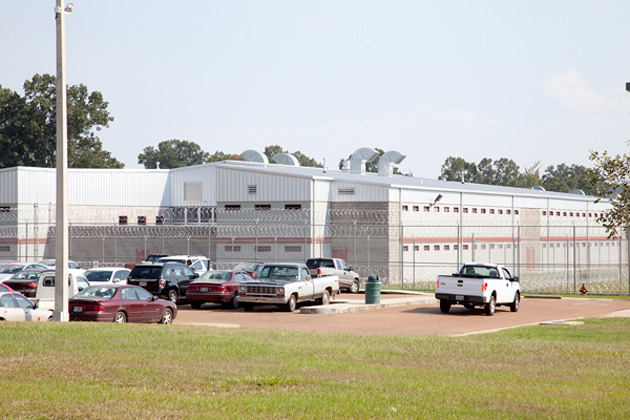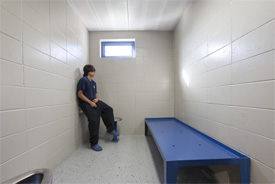
Part 9 of an 11-part series.
Serving time in prison is not supposed to be pleasant. Nor, however, is it supposed to include being raped by fellow prisoners or staff, beaten by guards for the slightest provocation, driven mad by long-term solitary confinement, or killed off by medical neglect. These are the fates of thousands of prisoners every year—men, women, and children housed in lockups that give Gitmo and Abu Ghraib a run for their money.
While there’s plenty of blame to go around, and while not all of the facilities described in this series have all of the problems we explore, some stand out as particularly bad actors. We’ve compiled this subjective list of America’s 10 worst lockups (plus a handful of dishonorable mentions) based on three years of research, correspondence with prisoners, and interviews with criminal-justice reform advocates concerning the penal facilities with the grimmest claims to infamy.
We will roll out the final contenders this week, complete with photos and video. Number 9 is a corporate-run facility where children allegedly have been subjected to a heartrending pattern of brutal beatings, rapes, and isolation.
Walnut Grove Youth Correctional Facility (Leake County, Mississippi)
Number of prisoners: Capacity 1,450 (actual population in flux)
Who’s in charge: (current) Lawrence Mack, warden; (former) George Zoley, CEO, the GEO Group; Christopher B. Epps, commissioner, Mississippi Department of Corrections
The basics: Efforts are underway to clean up and clear out Walnut Grove Youth Correctional Facility, which one federal judge called “a cesspool of unconstitutional and inhuman acts” visited upon children as young as 13. For years, the kids at Walnut Grove were subjected to a gauntlet of physical and sexual assaults, and psychological abuse including long-term solitary confinement. All of this took place under the management of private prison conglomerate the GEO Group.
The backlash: Evidence gathered for a report by the Justice Department and a lawsuit by the ACLU and Southern Poverty Law Center “paints a picture of such horror as should be unrealized anywhere in the civilized world,” Federal District Judge Carleton Reeves wrote in a 2012 court order. The court found that conditions at Walnut Grove violated the Constitution, not to mention state and federal civil and criminal laws. Guards regularly had sex with their young charges and the facility’s pattern of “brutal” rapes among prisoners was the worst of “any facility anywhere in the nation” (court’s emphasis). Guards also were deemed excessively violent—beating, kicking, and punching “handcuffed and defenseless” youths and frequently subjecting them to chemical restraints such as pepper spray, even for insignificant infractions.
The guards also sold drugs on site and staged “gladiator-style” fights. “It’d be like setting up a fight deal like you would with two dogs,” one former resident told NPR. “They actually bet on it. It was payday for the guards.” Said another: “A lot of times, the guards are in the same gang. If the inmates wanted something done, they got it. If they wanted a cell popped open to handle some business about fighting or something like that, it just pretty much happened.” Kids who complained or tried to report these incidents faced harsh retribution, including long stints in solitary.
Judge Reeves wrote that the state had turned a blind eye to the prison company’s abuses: Walnut Grove’s charges, “some of whom are mere children, are at risk every minute, every hour, every day.” In accord with a court decree, the facility’s youngest residents have been moved to a state-run juvenile facility, and Mississippi canceled its contract with GEO—which still runs some 65 prisons nationwide. The contract was handed over to another private prison company, Management and Training Corporation, which also has been a target of criticism for advocates of criminal justice reform.
Also read: “The Lost Boys,” about what happens when you put kids in an adult isolation facility.
Watch: Local news report on a protest by Walnut Grove parents.
Next prison: An island prison where guards allegedly “use unlawful, excessive force with impunity.”
Read more: America’s 10 Worst Prisons index page.
Research for this project was supported by a grant from the Investigative Fund and The Nation Institute, as well as a Soros Justice Media Fellowship from the Open Society Foundations. Additional reporting by Beth Broyles, Valeria Monfrini, Katie Rose Quandt, and Sal Rodriguez.

















